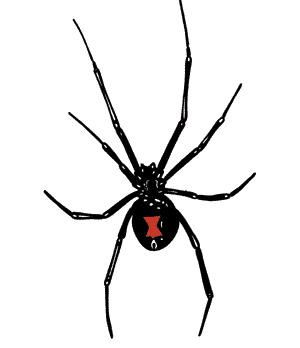 In our next group of unwanted critters (Raccoons, Squirrels, and Mice to Snakes and Scorpions) we are going to introduce the next item which is those pesky spiders. For the most part, spiders are beneficial to keeping flying insects under control, but not all of them. In our state we have 4 poisonous versions which includes 3 different “Widows” and the Brown Recluse. For a list of poisonous spiders in your state you may wish to check out VenomByte.com which includes pictures & descriptions.
In our next group of unwanted critters (Raccoons, Squirrels, and Mice to Snakes and Scorpions) we are going to introduce the next item which is those pesky spiders. For the most part, spiders are beneficial to keeping flying insects under control, but not all of them. In our state we have 4 poisonous versions which includes 3 different “Widows” and the Brown Recluse. For a list of poisonous spiders in your state you may wish to check out VenomByte.com which includes pictures & descriptions.
Prevention:
- If possible, avoid placing your hands where they may be hiding, such as under rocks, logs, planters (5 Black Widows & associated egg sacks were under 3 of ours),or any other nice little dark place where they will not be disturbed like inside a box where you are storing that…
- Do not play with or provoke them – generally they will try to leave the area & only bite when they feel that either their eggs or they themselves are in danger. It is better to just step back, see where they go & either squash them or apply poison to that area.
- Wear gloves at minimum when moving items – as an FYI, while many state you should wear pants & long sleeve shirts they can still get under them so be careful. I got bit three times this week while wearing pants after opening up a wall.
- Flip items up first with a stick to make sure nothing nasty is waiting for you or use a rake instead of your hands when cleaning up mulch or leaves around the property – i.e. don’t put your hands into or where you can’t see first.
- Before bringing wood in for the winter, moving or stacking it, I always prefer to thump the log on the ground or another log to dislodge any that may be hiding.
- If you have issues with them in the house or are pulling some clothes out of storage – Inspect the items carefully & shake all the items out.
Around the House / Farm /Shop:
- On the outside, remove any trash, logs, boards, stones, bricks and other objects / junk that would make a good hiding place from around your house, barns, ditches, and ponds.
- Keep the grass closely mowed, and prune bushes and overhanging tree branches away from the house. This will not only helps prevent damage to your house, but not allow them an easier means to access it.
- Just like our other pesky critters, spiders can fit into the smallest of holes, so make sure you caulk any small cracks, holes, make sure torn screens are replaced / repaired, and your weather-stripping is in good condition.
- Avoid storing firewood inside your house, or right beside your house. Once winter is over, it needs to come out of the house, off the deck, and away from the structure.
Removal from area:
Hmmm, this one is pretty simple; death – squash or poison them and the associated egg sacks.
In case you are bitten:
For most bites, the advice is the same (below) – but if you happen to know the exact type of spider, it would be wise to check a trusted site or call your doctor for any specifics especially if you have a medical condition that may impact you more than a “normal” healthy individual, are elderly, or a child is bitten (besides it makes some people feel better). While many sites advocate capturing the spider, may I recommend that you use your smart phone for something really smart – snap a picture of it & kill it.
- Clean the bite area with soap and water, and apply an antibiotic cream – personally I am old school & I also use Hydrogen Peroxide, though some say this it isn’t recommended anymore for any type of wound(s).
- If in pain, or worried – apply ice to the bite area to slow absorption of the venom, elevate and immobilize the extremity while waiting for help or a ride.
- If you start developing cramps, shows signs of an infection, it is not healing, or you get bit and start vomiting, get nauseous, or develop a fever or a rash – call or seek medical help.
Just as a reminder from California Poison Control: Frequently, when people with spider bites call the Poison Center, they think there is some special treatment that is necessary for their bite. There is no specialized therapy other than treating the symptoms. Most importantly, keep the wound clean to prevent infection. If the wound does not heal or does develop an infection, see your physician. Do not wait days and weeks while the wound continues to get worse.
